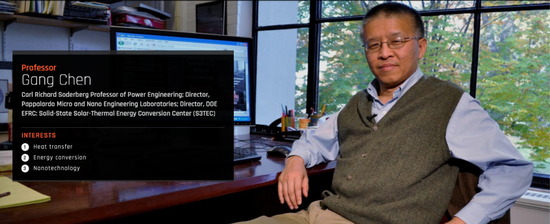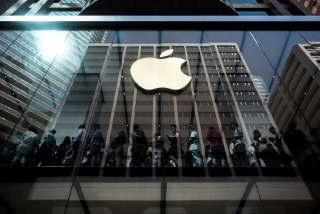新浪科技讯 北京时间1月15日消息,当地时间1月14日,美国司法部官网消息显示,56岁的美国工程院院士、麻省理工学院(MIT)教授陈刚因未能向美国能源部披露其在中国的工作和获得的奖励而被起诉和逮捕。据美国司法部网站披露的信息,美国对电汇欺诈的指控,最高可判处20年监禁、3年的监督释放,以及最高25万美元的罚款。
 麻省理工学院机械工程系陈刚教授(图片来源:MIT网站)
麻省理工学院机械工程系陈刚教授(图片来源:MIT网站)我国著名生物学家、北京大学校务委员会副主任、理学部主任、生物学讲席教授,北大麦戈文研究所创始所长、北大-清华生命科学联合中心创始主任、北京脑科学中心创始主任饶毅教授在其个人公众号《饶议科学》就此事发声,发布《致MIT校长副校长的信:抬起头颅 直起脊梁》一文,申明这一逮捕行动是“种族主义行为“。”如果MIT不支持陈刚博士,MIT将被认为参与了二十一世纪最糟糕的学术界种族歧视案例之一。”
 饶毅教授
饶毅教授饶毅教授《致MIT校长副校长的信:抬起头颅 直起脊梁》全文如下:
麻省理工学院(MIT)校长Rafael Reif
MIT研究副校长Maria Zuber
亲爱的Reif和 Zuber博士
波士顿联邦调查局(FBI)于2021年1月13日逮捕陈刚博士不是其他,就是种族主义行为。
如果MIT不支持陈刚博士,MIT将被认为参与了二十一世纪最糟糕的学术界种族歧视案例之一。
陈博士是受高度尊重的MIT科学家。他与中国的关系是学术界非常正常的关系。
陈博士与南方科技大学(南科大)的关系,你们两位都知道。南科大所在的深圳市领导曾经访问MIT,与MIT领导层会晤。陈博士与南科大签署的合约是代表MIT,不是代表他本人。陈博士咨询南科大丝毫不是秘密。
FBI对陈博士的关键指控是陈博士在申请能源部经费时,没有披露他与中国的五个关系:1)南科大顾问,2)中国国家自然科学基金会的评审专家,3)中关村发展集团战略科学家,4)中国留学生基金会顾问,5)中国第四届海外专家顾问。
这一指控极其荒谬。首先,研究经费发放机构要求申请人披露与研究相关的关系,以避免同一研究有多重经费支持。如果申请人有一项研究同时得到美国两个基金、或一个美国基金和一个中国基金支持,他应该披露。但以上五个关系都无关陈博士的研究经费,所以他当然不用在研究经费申请上披露。其次,他的这些关系是大多数学者一般的校外活动,不影响其研究和工作。它们不影响经费评审过程,不用向经费单位披露。第三,美国科学家为外国基金发放单位(如中国国家自然科学基金委)评审是常规工作。如果不披露为中国国家基金会评审经费是罪,那么有可能几乎所有MIT教授都可以被起诉曾经为以色列、意大利或英国政府的经费机构评审过研究课题。单单挑出中国的科学基金会为政府机构当然是种族主义,因为所有主要政府都有科学基金会。
陈博士的其他四个关系,可能充其量加起来一年只需要用他半天时间。与他有那些关系的机构不过是用他的名字,以便报告上级,自己“咨询了”国际顾问。
问题的根本所在,当然众所周知:川普主义从根本上腐蚀了美国的道德。
美国需要做很多才能从川普主义恢复过来。全世界都见证了,在川普和他的谎言面前,美国很少政治家有脊梁。
人们当然希望,作为学术卓越和学术自由灯塔的MIT,将昂起头颅,在波士顿FBI及其探员面前显示自己的脊梁,保护陈博士。
这是为陈博士,也是(如果不是更是)为MIT。
世界在看着。
饶毅
主题: MIT and racism Re: A slippery road
Rafael Reif
Chancellor, MIT
Maria Zuber
Vice Chancellor for Research, MIT
Dear Drs。 Reif and Zuber,
The arrest of Dr。 Gang Chen on January 13th 2021 by the Boston FBI is nothing but thinly veiled racism。
If MIT does not support Dr。 Gang Chen, MIT will be implicated in one of the worst cases of academic racism in the 21st century。
Dr。 Chen is a highly respected scientist at MIT。 His associations with China are very normal in academia。
Dr。 Chen’s association with the Southern University of Science and Technology, or SUSTech, is known to both of you。 The top leadership of Shenzhen city, where SUSTech is located, visited MIT and have met the MIT leadership。 Dr。 Chen signed an agreement with SUSTech on behalf of MIT, not on behalf of himself。 There is no secret hidden by Dr。 Chen that he is advising SUSTech。
The key charge by the FBI was that Dr。 Chen did not disclose on his grant proposal to the DOE 5 associations with China: 1) an advisor to SUSTech, 2) “review expert” for the National Natural Science Foundation of China or NNSFC, 3) a Zhongguanchun Development Group or ZDG Overseas Strategic Scientist, 4) an advisor to the China Scholar Councilor or CSC, and 5) a “4th Overseas Expert Consultant” to the PRC government。
This is a ridiculous charge。 First of all, funding agencies require applicants to disclose associations that are related to the research in the grant proposal, so that a research project does not receive duplicate funding。 So, if Dr。 Chen has a project funded by both a US agency and another US or Chinese agency, he should have disclosed it。 But none of the 5 associations are related to Dr。 Chen’s research funding, so of course he should not list them on his grant proposals。 Secondly, these associations are usual outside activities of most scholars that do not impinge on their own research or work。 Thus, they do not affect grant review processes and do not need to be disclosed to funding agencies。 Thirdly, reviewing grants for other countries (such as NNSFC) is a regular activity。 If failure to report reviewing for NNSFC is a crime, then almost all MIT professors could be charged with reviewing for funding agencies of Israeli, Italian, or British governments。 Singling out a science foundation of China as a government agency is simply racism as all major governments have science foundations。
The other four associations of Dr。 Chen would add up to less than half a day of work per year because those associations have little to ask him other than using his name to let superiors know that each agency “had consulted” international experts。
The root of the problem is, of course, known to all of us: Trumpism has fundamentally eroded morality in the US。
Much have to be done for the US to recover from Trumpism。 The entire world has witnessed how few US politicians have spines, in front of Trump and his lies。
We certainly hope that MIT, a beacon of academic excellency and freedom, will hold its head high and show your spine in front of a racist Boston FBI and its agents in defending Dr。 Chen。
This is for Dr。 Chen, but it is also, if not more, for MIT。
The world is watching。
Yi Rao
发件人: Transmissome <yrao@pku.edu.cn>
日期: Wednesday, December 19, 2018 at 1:51 PM
至: Maria Zuber
抄送: “L。 Rafael Reif” >, “R。 Gregory Morgan”
主题: A slippery road
Dear Maria,
I appreciate that you are “a strong and vocal proponent of the U.S。 having an open research system that attracts the best students and faculty from around the world”。
The NIH recommendation for strict control is based on a rule that was not and can not by enforced in the court。 In effect, it will only create frictions in the US and distrust by other countries such as China。
I am glad that, on your panel, Dr。 Wallace Loh of the University of Maryland studies law。
NIH is using “Other Supports” to ask applicants to list funding sources and projects。 But:
1) what was written in Other Support was never a big deal。 The major purpose was to ensure that there is no duplication of federal support of the same project at the same time。 Most applicants would list federal and other public sources, but not private donations。
Funding from foreign sources has always been unclear, but no one cares。 There is a good possibility that Japanese government funds, in the form of RIKEN, support research on learning and memory at MIT。 You can check, but my guess is that such support has not been listed in any of the NIH grant applications of the MIT investigators。 I do not blame them, I think that this was OK if I sat on an NIH study section reviewing their grant applications。
2) NIH grant applications are supposed to be true, but how can they be required to be “complete”? This is scientifically impossible。
The major parts of the grant application are not “OTHER SUPPORT”, but “Preliminary Studies” and “Research Design and Methods”。
In most experiments, one will obtain positive and negative results。 Few if any grant applicants will list negative results countering their own plan in grant proposals。 It is understood and allowed because researchers have the freedom to decide the best way forward based on their own judgement of their results。 They are not required to provide complete information。 If they choose the wrong road despite their knowledge of negative results, it will be to their detriment。 But they can ignore some negative results and move forward and, with more experiments after NIH funding approval and support, find their hunch to be correct。
This happens in science again and again。 Because of this, Jim Watson of the double helix fame once remarked that a good theory should not be ruined by bad results。
3) How can Chinese or Japanese funding influence NIH in a bad way? I can not imagine。 I don’t know who can。
If a PI in the US gets an extra lab in China or Japan, the funding is usually for the labs in China or Japan, not his/her US labs。
His/her home institutions would want to ensure he/she still performs well in the home institution, but that requires no extraordinary caution because many biomedical scientists have associations with companies。
Because the PI’s US lab is not supported by other sources, it is unclear whether he or she should list them in OTHER SUPPORT。
If a PI has funding from another country supporting his/her lab in the US, that complements and amplifies the NIH support, and strengthens the mission of the NIH。 How can that be wrong? NIH study sections review grant applications with NIH criteria, and if NIH decides to fund a proposal, it is because the NIH finds it good enough。
In summary, the ado about nothing created by the NIH will have no good effect because there was no real problem to be solved。 Problems with a few bad eggs are not systematic and can be solved with existing rules and laws at existing institutions, without consuming the time and efforts of the NIH。
Keeping this report only sends a signal that the NIH and US academic institutions agree with the Very-Large-Brain: keep distances from the Chinese。
What a sad turn of events? US scientists and academic institutions used to support scientists who suffered in Soviet Union, for example。 Now, some Chinese academics are blocked from visiting the US (including attending symposia at MIT), or intensely questioned at the airports。 This is the first time US scientists and academic institutions have joined in persecuting scientists from other countries (a few Houston biomedical researchers were investigated in the Clinton manner, stretching from one question to another until the focus was far from the original and could not even be tested in courts but careers were already ruined, all sending the same signal: dare you have Chinese connections)。
If academics can go this far, then what can possibly prevent the Very-Large-Brain and his people to push in other ways (note the recent arrest of a Chinese IT company executive, a Chinese citizen supposedly have violated US domestic law while working in China)?
The Chinese are now puzzled, and if push comes to shovel, the usually quiet Chinese will be forced to walk away。
This is a slippery road that was pushed by the US side along, against many other countries。
Yi
发件人: Maria Zuber
日期: Wednesday, December 19, 2018 at 6:19 AM
至: Transmissome
抄送: Maria Zuber
主题: Re: thinly veiled discrimination based on national and racial origins
Dear Prof。 Yi--
Thank you for taking the time to write to me and other members of our panel about your concerns。 I am a strong and vocal proponent of the U.S。 having an open research system that attracts the best students and faculty from around the world, and those views are shared by our entire panel。 Our report explicitly discusses the value of foreign scholars。
That said, it is important to ensure that all researchers who receive research funding from the U.S。 government be open about their support and comply with basic, longstanding rules。 The goal of our report is to remedy transgressions that have been uncovered at NIH, so that valuable international collaborations can continue。
Thank you again for taking the time to lay out your concerns。
Sincerely—
Maria Zuber
On Dec 15, 2018, at 11:16 PM, Yi Rao wrote:
Dear Dr。 Zuber,
I met the delegation led by the MIT president a few weeks ago。 I was encouraged that MIT is not bending to the toxic brand of Trumpistic xenophobia。
I am surprised now that you were one of the co-signatories of to the report presented by the Advisory Committee to the NIH director: Foreign Influences on Research Integrity。
I was on the Faculty of Washington University School of Medicine from 1994 to 2004, in the then Department of Anatomy and Neurobiology (now Neuroscience)。 I enjoyed my ten years at Wash U and my children also grew up there。 I felt welcome at Wash U, though racial discrimination in hiring continued but discriminations were not overt。
The report on Foreign Influences on Research Integrity is a textbook case of distortions, fabrications and lies, all beginning with thinly veiled national and racial discriminations。
NIH’s mission is to support biomedical research to improve human health。 Your institution is here to save lives, not a military organization to kill people of other countries。 NIH does not even claim intellectual properties from research supported by its grants。 So the current hysteria is not based on your own mission, but hypocritic response to Trumpism。
MIT has many Chinese scholars and students。 The first Chinese biochemist Hsien Wu was trained at MIT before he invented the most useful method for measuring blood glucose with Dr。 Folin at Harvard Medical School。 The Folin-Wu method helped millions of patients over many decades。 Upon returning to China in the 1920s, he became father of biochemistry in China and made contributions regarding antibodies and protein folding。
I hope that you do not view current Chinese students and scholars at MIT as thieves sent by China。 They all went there for career development, some even with American dreams。 How disappointed they would be if they find out that their director and deputy director are all responsible for a report implying that China a systematic effort to steal intellectual properties through students and scholars in non-militarily related disciplines。 Had it not been about them, they would have “laughed to death” (a Chinese proverb)。
I am one of the 4 scholars who proposed what was later named awkwardly as the Thousand Talent Program。 Its purpose was solely to recruit。 All countries do this。 Canada has a program called Canadian Chairs which also includes recruitment。
From the 1980s to 2010, Chinese universities and research institutes have been semi-depleted in science because large numbers of Chinese scientists have emigrated。 It is very reasonable for China to recruit when resources allow。 The other reason is for China to pay back to the world with increasing support of science: most advances in sciences contribute to humankind, not limited to one country。 It is so ironic when China’s effort to contribute to humankind is now distorted by Trumpism prevalently in the US。
A major problem with the Thousand Talent Program is that a fraction of the putative recruits hesitate about returning to China full time, some of them may need a transition, which is reasonable, but some intentionally take labs and funds in China while living and working in the US with no intention to move to China full time。 Whether this is allowed is decided by individual institutions, and not encouraged by the central government。 If fact, the government wants to clean up this kind because it is viewed as a waste of Chinese resources。 Some institutions intentionally hide such cases from the government so that they do not get blamed。 For universities such as Peking, we do not allow that。 When such cases arise, China usually loses because such individuals have full time jobs in the US, and thus stick to US rules and laws, but not those in China where they only have part time jobs。 Some even take such advantages only to visit their families。
Thus, not only the Thousand Talent Program never tries to steal intellectual properties, but its major problem actually hurts China。 It does not hurt the US at all, when US scientists get extra funding and resources。 Research in biomedical sciences leads to papers published in journals accessible to all scientists。
When a few individuals behaved wrongly, it is their fault, not the fault of an entire country or billions of people。 The current NIH director, Dr。 Francis Collins, once withdrew two papers because of fabrications by a student in his lab。 Should we call the Collins lab a thief or liar? Or by extrapolation, call the NIH an institution led by someone who had scientific misconduct? Of course not。 Because the problems were the faults of that student, not Dr。 Collins or the NIH (or the University of Michigan at that time)。
I hope that you will revise this report or withdraw your signatory。
When history looks back, this report, as it stands now, will be a stain on everyone who signed the morally corrupt report。
Sincerely
Yi Rao, Ph.D。
Professor and Director, PKU-IDG/McGovern Institute for Brain Research
Dean, Division of Sciences, Peking University
Director, Chinese Institute for Brain Research, Beijing
China
<NIH 12 13 2018 Foreign Influences[1]。pdf>
____________________________________________
Maria T。 Zuber
Vice President for Research
E.A。 Griswold Professor of Geophysics
Massachusetts Institute of Technology
77 Massachusetts Avenue, 3-234
Cambridge, MA 02139-4307
http://orgchart.mit.edu/vice-president-research
Research Office:
Department of Earth, Atmospheric and Planetary Sciences
Massachusetts Institute of Technology
77 Massachusetts Avenue, 54-518
Cambridge, MA 02139-4307
Phone: 617.253.6397
http://www-geodyn.mit.edu
Not all those who wander are lost。
-- J.R.R。 Tolkien

“掌”握科技鲜闻 (微信搜索techsina或扫描左侧二维码关注)








































